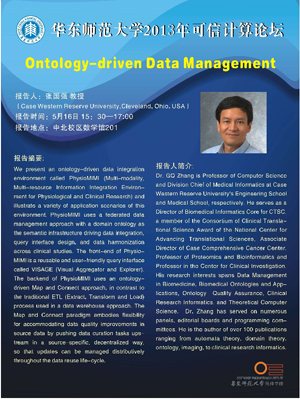报告题目:Ontology-driven Data Management
报告人:张国强 教授(Case Western Reserve University,Cleveland, Ohio, USA)
报告时间:
报告地点:中北校区数学馆201

报告摘要:
We present an ontology-driven data integration environment called PhysioMIMI (Multi-modality, Multi-resource Information Integration Environment for Physiological and Clinical Research) and illustrate a variety of application scenarios of this environment. PhysioMIMI uses a federated data management approach with a domain ontology as the semantic infrastructure driving data integration, query interface design, and data harmonization across clinical studies. The front-end of PhysioMIMI is a reusable and user-friendly query interface called VISAGE (Visual Aggregator and Explorer). The backend of PhysioMIMI uses an ontology-driven Map and Connect approach, in contrast to the traditional ETL (Extract, Transform and Load) process used in a data warehouse approach. The Map and Connect paradigm embodies flexibility for accommodating data quality improvements in source data by pushing data curation tasks upstream in a source-specific, decentralized way, so that updates can be managed distributively throughout the data reuse life-cycle.
报告人简介:
Dr. GQ Zhang is Professor of Computer Science and Division Chief of Medical Informatics at